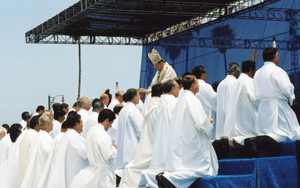The word that Rome has granted the American hierarchy's request to establish the order of deacons in this country comes as welcome news. By this act an important feature of the Roman Catholic ministry is restored to it. The origins of the order of deacons go back to the apostles themselves. The splendor of its service can be seen in much of the history of the early Church.
A need for more laborers is evident in the American vineyard, where 5,000 towns and 671 counties are presently without the services of a priest. There is thus great promise in the newly restored diaconate. At the same time, problems are not hard to anticipate. Not the least of these will turn on the relationship of the order of deacons to the priesthood.
Historically, the diaconate became a temporary stage for candidates en route to the priesthood. Although diakonia, service, was itself the very meaning of Christian authority, in a Church that grew increasingly stratified the diaconate came to be looked upon as lacking in status. It was seen not so much as another way of serving, but as a step up the ladder. There may be a continuing temptation to contrast the deacon with the priest and so arrive at a negative identity for the diaconate.
Such a contrasting deprives the order of deacons of its own intrinsic worth and distinctive ministerial importance. A negative identity immediately invites the laity to look on the deacon as a dilution, a quasi-priest who could not find it within himself to go all the way. It also invites the rest of the clergy to treat his services as those of a lackey for his masters.
A possible problem of another sort is suggested when one reads the passage from Vatican II's Constitution on the Church (§ 29) that provides for the restoration of the diaconate, as well as the papal motu proprio that outlines a plan for implementing this provision and the American Bishops' announcement giving the local particulars. Their tenor would at times lead one to believe it is not the priesthood that may threaten the diaconate, but the diaconate that could threaten the priesthood. Extreme caution is demanded, for instance, concerning marriage and the deacon. The history of debate at Vatican II reveals that some bishops feared lest the deacon's vocation should come to appear more attractive and deter men from entering a celibate priesthood.
Problems, however, do not outweigh the many clear advantages to be hoped for from a viable order of deacons in the American Church. There is the obvious advantage of added manpower. There is also the importance for the laity of direct experience of a ministering diaconate. They could come to isolate Eucharistic ministry from the many other services performed at present by the priest and thus better appreciate its centrality. They could experience ministry at the hands of a man whose professional life was other than that of a full-time clergyman. They could overcome their unfamiliarity with a married clergy.
In addition, restoration of the diaconate might foster in the Church a healthy pragmatism about ministry and encourage a certain flexibility in experimenting with forms of ministry. Finally, it could also be a moment for the restoration of the meaning of all Christian ministry as service rather than status.








